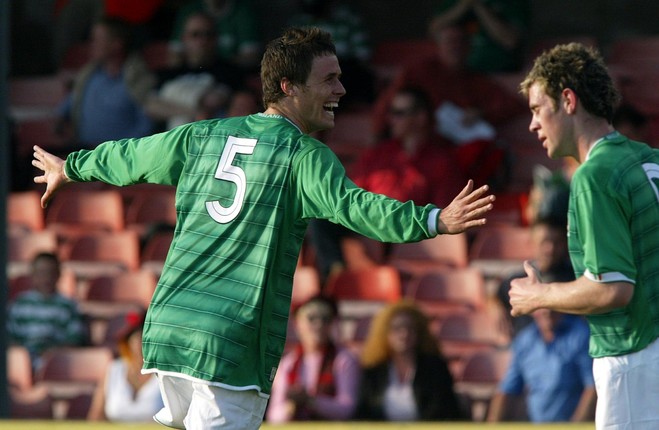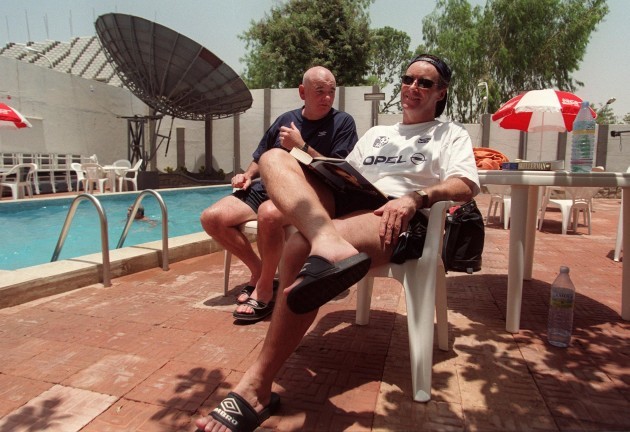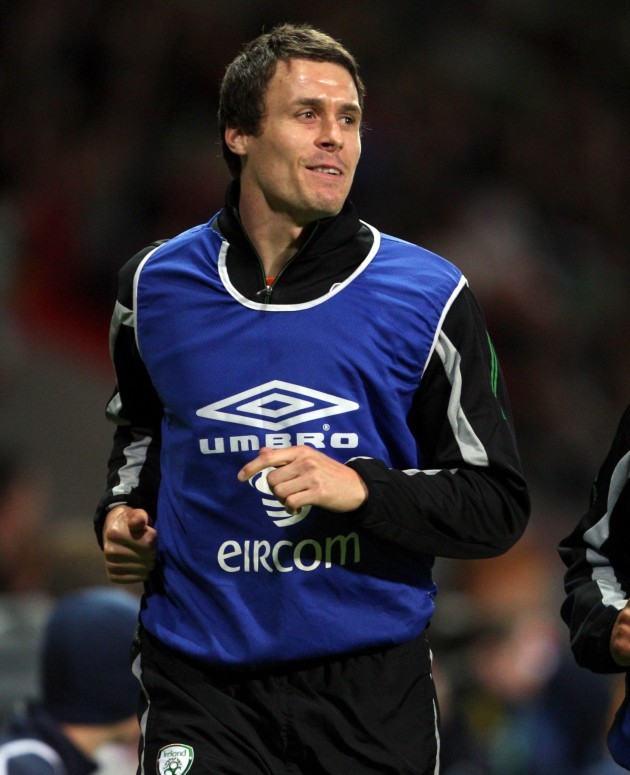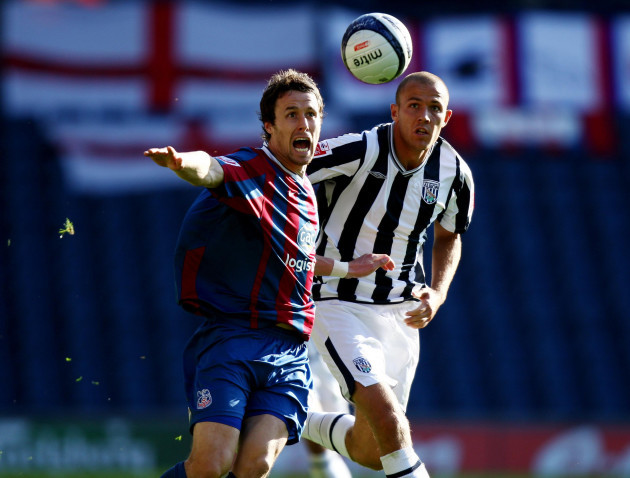MAY 2000 AND there’s a rap on the window. “Paddy, good lad now, get out of that pool.”
Paddy does what he’s told. He’s 16, carefree and bored. A day earlier Ricardo Quaresma’s Portugal had beaten his Ireland in the European Under 16 championship opener, a game played under the Israeli midday sun, the early schedule explained by a desire to allow local schoolkids catch a glimpse of tomorrow’s stars.
But by half-time, the locals were scrambling for shelter underneath the shade-covered seats. “Imagine making players run around for 90 minutes in that heat,” Brian Kerr says afterwards, before educating his boys about the importance of hydration and staying indoors until the sun goes down.
Stephen Kenny is alongside him. Twenty-nine years old and learning his trade, invited along by Kerr to scout the opposition in this elite, underage tournament. His hair was darker then, his voice even quieter than it is now. The previous day he’d seen Russia defeat England and in Kerr’s hotel room, Kenny is talking about Dmitri Sychev, a kid who’d go on to become the fourth youngest to score in a World Cup.
A video of Sychev’s performance against England is playing out in front of us. Kerr has the volume turned down, a pained-look of concentration on his face as he asks Noel O’Reilly, his assistant, to press pause and rewind at a particular moment in the first-half when England nearly score from a corner.
Suddenly a notepad comes out. “Where’s me pen?” Kerr says. Sheets of paper are being lifted, books moved, before O’Reilly goes across to the windowsill and looks out. “Ah, Jaysus,” he says, “they’ve only gone and jumped into the pool.”
That 16-year-old kid has grown up to become a Noel O’Reilly, Stephen Kenny and Brian Kerr, the educator in charge of Crystal Palace’s Under 18s. Again he has jumped into the deep end, nurturing teenage hopes and dreams, and again he has someone looking over him – Roy Hodgson, this time, a managerial grandee.
When Paddy McCarthy sees Hodgson shuffle his 72-year-old frame across the training pitches, he can’t help imagine the Crystal Palace manager running on these very same fields way back in 1963, when he was a Palace apprentice making his way in the game. “I’ve had a front row access to all these great football men,” McCarthy says of a career working under Hodgson, Kevin Keegan, Tony Pulis, Neil Warnock, Joe Royle, Dougie Freedman. “You always looked at how they dealt with players and always noticed that even though they carried themselves with a lot of confidence – it didn’t stop them being humble. Roy has managed England, Liverpool, Inter Milan, has been in football over half a century yet his work ethic is unbelievable. But as a young coach, I can’t go out and try and copy Roy Hodgson or Neil Warnock because players would see through that right away. You have to be yourself, not an impersonator of someone else.”
He talks about his coaching philosophy: the clarity of the message, the consistency of the performance, the responsibility that comes from being paid to play a game they loved as children.
“It’s important to have things you stand for,” he says, remembering the one thing that hurts. At no stage in his career did he ever get to stand as an Ireland player for Amhrán na bhFiann.
**
When he was seven, all the Edenmore boys headed into O’Connell Street. Jack’s army were coming down that street after hopping off the plane from Rome. It was the summer of Italia 90 and Paddy McCarthy waved up at the players when their open-top bus passed. Five years later, he’d a £2 ticket for Ireland against England, tucked safely away in the schoolboy section as the boys from Combat 18 deconstructed the seats in the old West Stand. Those days and nights shaped him, as did the afternoons watching his uncle, Sean Byrne, play for Shamrock Rovers, the long evenings kicking around on the green outside his house.
When Ireland called, he answered, captaining his country’s Under 16 side, featuring in two underage European championships and a World Youth Cup. There’d be Under 21 and Ireland B caps, too, call-ups to senior squads under Kerr, Steve Staunton and Giovanni Trapattoni. And all this time he was working his way through four of the clubs that now occupy top-half positions in the Premier League, making 301 appearances in a career that brought him from Manchester City to Crystal Palace, via a good few loan moves and the Leicester City captaincy.
He spent a decade in the Championship but never played for Ireland once – arguably the best this country has never capped.
“It is something I would have loved to have done and feel at certain stages that I probably should have got one,” McCarthy says.
I never went to the press about it because I wasn’t a self-promoter, one to make claims. My attitude was you don’t talk yourself into the team; you play your way in there. It does seem a little bit (harsh that I was never capped). I don’t know what the (reason) was. But I do know one thing – it would have made me immensely proud.”
**
Three-hundred-and-one times he walked up those tunnels, heard those roars. He wore the armband at Leicester, Palace, Sheffield United and Bolton – clubs with history, tradition and photos on the wall. But the biggest game of his life isn’t in their colours or even in Ireland’s green. It’s for Boston United against Kidderminster Harriers, 22 February 2003, three days after Cian, his eldest child, is born. McCarthy was in the maternity ward when the call came from the Boston manager. Get yourself across here, son.
There was no time for sentiment, no time to reflect. But he remembers that journey across from Dublin, sitting alone on the plane, having a little conversation to himself. “This is it now,” he said to himself in a private pep talk. “It isn’t about you anymore; it is about them.” He was 19 and knew he had to provide for Niamh – his then girlfriend, now wife, and Cian. From that Kidderminster game on, he had a new outlook on the sport.
“Look, it was a massive moment in my life and it was a massive shock at the time. I was saying to Cain the other day; I was only two years older than you when you came into my life. His arrival gave me extra motivation, 100 per cent it did. No surer thing, I want my kids to look up to me as a person, to teach them the right things.
“I’m lucky to have the children, lucky to have Niamh. We’re so supportive of each other, our families have been unbelievably good to us too. We were young parents. Our circumstances changed but it was a case of right, let’s get on with this. Family was a huge motivating factor in my career. Every day, I went in there, I said to myself, ‘you’ve got to get better’. You’ve mouths to feed.”
**
He insists he isn’t proud. But he should be, given how his playing career was as good as over at 28, and yet through sheer bloody-mindedness and determination, he made it last until he was 33. Still, he refuses to speak about himself in ‘self-indulgent’ terms.
I was never satisfied,” he says. “The main thing that kept me at a high level was the fact that I was always trying to improve. I haven’t stood still long enough to look in the mirror because there are no limits on us as people to get better. I always felt there was more I could do.”
And in 2012, he felt like he’d cracked it. Palace offered him a new contract. “I felt so good; fitness wise, I was sharp. My positional play, put it this way, I felt I knew more about the game then than ever. I felt ready to go up a level.” Instead he got a career changing groin injury, one that ‘surgeons across the world couldn’t figure out’.
That was practically that. The sharpness was gone, he could hardly turn. “I was afraid I’d never play again, afraid I’d never be able to lift my kids up again. The injuries took such a toll on my body.”
But he never gave up. On days off, he’d get the train to Warwick to visit a chiropractor. Ice baths became part of his daily routine. He made it back. Tony Pulis trusted him for Palace against Hull. January 28, 2014 – the one time he played in the Premier League. “If I allow myself to look back on anything with a little sense of pride, it’s that; that I did everything I could to get back and play at that level. But I couldn’t do what I used to be able to do and if I’m honest, it affected me as a person. There was a lot of soul searching. When I look back on that, it’s disappointing those years were taken away from me.”
**
He’ll never forget his first love or her home. Manchester City, Maine Road. “It wasn’t like now. The ground wasn’t as shiny but wait til I tell ya, whenever you walked into that stadium, it was hairs-on-the-back-of-your-neck stuff. The roars, the songs. The thing I loved about City was that people looked out for each other. Doors were always opened. Les Chapman, the kitman, he’d look after the Irish boys, see if we were homesick. There was a kindness there.
“I’d offers to go to bigger clubs then – think about that, back then there were bigger clubs than Manchester City. But the place suited me, suited my personality. They’d the same values I have. The way those people behaved. That’s how I want to be as a coach.”
Palace now is like City then. In a divided Britain, they’re a unified club, the one McCarthy keeps being drawn back to, no matter where he goes. “In the past we didn’t always have the greatest facilities but is a club about buildings or is it about the people inside them? When this Covid lockdown came, the chairman was on the phone, letting us know our jobs were secure. He was a Palace supporter as a boy, so was the manager. All the staff here, the club is their passion. I love the club. There’s a good reason I’m here and it’s because the people here, the fans, the staff, they’re special.
“So yeah, I know this (managerial game) is such a tough market to crack but come on, we’re blessed to be doing what we do. There were hard days for sure and you don’t forget them. They drive you on. You never give up.”
The best ones may still be up ahead.




